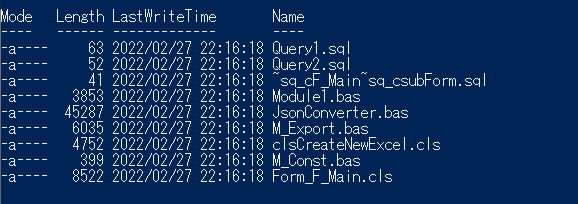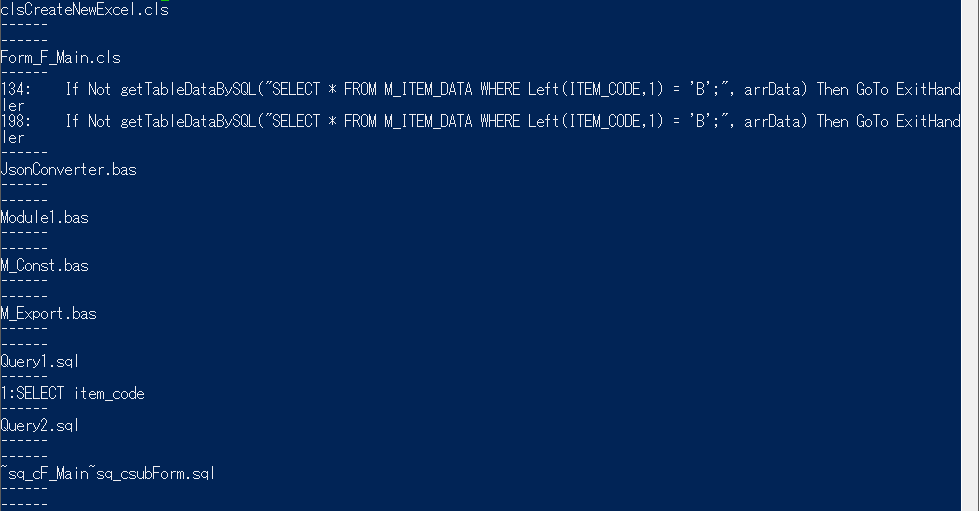VBA & POWERSHELL: THE TECHNIQUE TO EXTRACT A SPECIFIC STRING FROM MODULES, CLASSES OR SQL OF QUERIES IN ACCESS DATABASE
Overview
If you find an English expression that feel incorrect or awkward, please let me know.
Message box of Disqus is under the article.
Or my E-Mail is here.
ABOUT THIS ARTICLE
When creating a Access VBA tool, you may search and extract a specific string from modules, classes, or query source SQL,
mainly in order to refactor code or add a new feature.
For modules and classed, on VB Editor screen you can search it by pressing ctrl + F, but you can't get a list of matches and it's difficult to grasp the total result.
And, there is not a function to search a string from query source SQL in Access as of 2022.
Therefore, under Windows, I export each data as a file and then extract target string with powershell command like Linux's Grep command, as explained below.
CREATION ENVIRONMENT
- Windows10 Home
- MSOffice 2019
- PowerShell 5.1
TECHNIQUE
EXPORT EACH DATA AS A FILE
ABOUT
You can export all of modules and classes by running VBA function at once. To do so, you use Export method of the VBComponent object.
it may be easy to use its own export function.
And, through this function, you'll find query sources are exported as a sql file simultaneously.
CODE
1'******************************************************************************************
2'*Function :output codes of module and class, and query source SQLs
3'******************************************************************************************
4Sub exportCodesSQLs()
5
6 'Consts
7 Const FUNC_NAME As String = "exportCodesSQLs"
8
9 'Vars
10 Dim outputDir As String
11 Dim vbcmp As Object
12 Dim fileName As String
13 Dim ext As String
14 Dim qry As QueryDef
15 Dim qName As String
16
17
18
19 On Error GoTo ErrorHandler
20
21 outputDir = _
22 Access.CurrentProject.Path & _
23 "\" & _
24 "src_" & _
25 Left(Access.CurrentProject.Name, InStrRev(Access.CurrentProject.Name, ".") - 1)
26 If Dir(outputDir, vbDirectory) = "" Then MkDir outputDir
27
28 'output modules, classes
29 For Each vbcmp In VBE.ActiveVBProject.VBComponents
30 With vbcmp
31 'set extension
32 Select Case .Type
33 Case 1
34 ext = ".bas"
35 Case 2, 100
36 ext = ".cls"
37 Case 3
38 ext = ".frm"
39 End Select
40
41 fileName = .Name & ext
42 fileName = gainStrNameSafe(fileName) 'replace some charactors which aren't allowed to use for a file name.
43 If fileName = "" Then GoTo ExitHandler
44
45 'output
46 .Export outputDir & "\" & fileName
47
48 End With
49 Next vbcmp
50
51 'output query sources
52 With CreateObject("Scripting.FileSystemObject")
53 For Each qry In CurrentDb.QueryDefs
54 Do
55 qName = gainStrNameSafe(qry.Name) 'replace some charactors which aren't allowed to use for a file name
56 If qName = "" Then GoTo ExitHandler
57
58 If qName Like "Msys*" Then Exit Do 'exclude queries related MS system
59
60 With .CreateTextFile(outputDir & "\" & qName & ".sql")
61 .write qry.SQL
62 .Close
63 End With
64 Loop While False
65 Next qry
66 End With
67
68ExitHandler:
69
70 Exit Sub
71
72ErrorHandler:
73
74 MsgBox "An error has occurred and the macro will be terminated." & _
75 vbLf & _
76 "Func Name:" & FUNC_NAME & _
77 vbLf & _
78 "Error No." & Err.Number & vbNewLine & _
79 Err.Description, vbCritical, "Macro"
80
81 GoTo ExitHandler
82
83End Sub
84
85
86
87
88'******************************************************************************************
89'*Function :replace some charactors with a underscore and return replaced string. The charactors aren't allowed to use for a file name.
90'*Arg :target string
91'*Return :replaced string
92'******************************************************************************************
93Public Function gainStrNameSafe(ByVal s As String) As String
94
95 'Consts
96 Const FUNC_NAME As String = "gainStrNameSafe"
97
98 'Vars
99 Dim x As Variant
100
101 On Error GoTo ErrorHandler
102
103 gainStrNameSafe = ""
104
105 For Each x In Split("\,/,:,*,?,"",<,>,|", ",") 'array of chars not to be used
106 s = Replace(s, x, "_")
107 Next x
108
109 gainStrNameSafe = s
110
111ExitHandler:
112
113 Exit Function
114
115ErrorHandler:
116
117 MsgBox "An error has occurred and the macro will be terminated." & _
118 vbLf & _
119 "Func Name:" & FUNC_NAME & _
120 vbLf & _
121 "Error No." & Err.Number & vbNewLine & _
122 Err.Description, vbCritical, "Macro"
123
124 GoTo ExitHandler
125
126End Function
After running exportCodesSQLs,
you'll find all source files have been stored into 'src_ + Access file name' folder
directly under the folder where the Access file is located.

EXTRACT TARGET STRING BY POWERSHELL COMMAND
ABOUT
Launch PowerShell, and move the folder in which exported files are.
The following is a command to search a specific string like Linux's Grep command and show the list.
1Get-ChildItem | ForEach-Object{ Write-Output ($_.Name + "`r`n------") ; (Get-Content $_ | Select-String "here you write a string to be searched" ) | ForEach-Object{Write-Output ($_.lineNumber.Tostring() + ":" + $_) } ;Write-Output "------" }
First the file name to be searched is displayed, then row number and the row's text which came up is displayed.
The command loops this for each file.
DEMO
Suppose you want to search 'ITEM_CODE' from all files and look at the result list,
execute the command as follows.
1Get-ChildItem | ForEach-Object{ Write-Output ($_.Name + "`r`n------") ; (Get-Content $_ | Select-String "ITEM_CODE" ) | ForEach-Object{Write-Output ($_.lineNumber.Tostring() + ":" + $_) } ;Write-Output "------" }
The result is:

See Also
- Access VBA: A SIMPLE SAMPLE OF INSERTING AND DELETING A RECORD ON A SUBFORM
- Access VBA: THE THING YOU NEED TO BE AWARE OF WHEN CREATING EVENT LISTENER BY USING WITHEVENTS FOR FORM CONTROLS
- ACCESS VBA: I CREATED A TOOL EXPORTING TABLE DEFINITIONS DISPLAYED AT DESIGN VIEW IN A TABULAR FORMAT.
- ACCESS VBA: I CREATED A FUNCTION EXPORTING TABLE DEFINITIONS DISPLAYED AT DESIGN VIEW IN A TABULAR FORMAT.
- EXCEL VBA: TYPICAL PATTERNS FOR EXCEPTION HANDLING & SAMPLE OF HOW TO USE